
According to a 2021 study by the Federal Ministry of Environment, Nigeria⬈ generates approximately 32 million tonnes of solid waste annually. What’s worse, 2.5 million tons of that waste is mainly plastic. This means that Nigeria is one of the top 20 countries that pollute the globe.
What if the waste Nigeria produces creates jobs and improves the economy? That’s the bold mission behind Kaltani, a startup revolutionizing plastic recycling in Nigeria. Kaltani is proof that a circular economy is possible. This article discusses Kaltani and its Plastic waste recycling process.
The Man With a Vision
Kaltani⬈ startup was founded by Engineer Obi Charles Nnanna. He spent 13 years in the global energy sector abroad. When he returned to Nigeria, he noticed two major issues. The first thing he observed was rampant plastic pollution and the need for waste management in Lagos.
His second observation was the high rate of youth unemployment in Nigeria. Realizing that a single business could address both challenges, he decided to tap into Nigeria’s untapped recycling market. A massive market worth up to $10 billion. He founded his company, Kaltani, on the mission of turning “pollution to profit” and “waste to worth.”
Kaltani’s A-to-Z Approach to Plastic Recycling in Nigeria
Unlike other recycling companies in Nigeria, the Kaltani startup does not just collect, sort, and resell reusable waste. They are a plastic waste solution, an end-to-end clean-tech company. That is, they manage the entire waste recycling process from the beginning to the end. Mr Nnanna calls this approach the “A-to-Z” value chain⬈.
They collect waste and process it. After processing the waste, they resell the recycled materials themselves. This gives them complete control over the quality of their products. It also enables them to offer a comprehensive plastic waste solution to a wide range of clients.
The company’s recycling process started with a focus on plastic alone. With time, Kaltani expanded to other waste materials, evolving into an industrial clean-tech powerhouse in Nigeria. Today, Kaltani’s services include recycling of paper, glass, rubber, and organic waste. This expansion maximizes resource recovery and waste management in Lagos.
The company’s expansion into organic waste recycling has given birth to its Organic Fertilizer Facility. They now transform food scraps and agricultural byproducts into fertilizers. Kaltani does this through controlled composting and a curing process. These organic fertilizers help farmers restore the health of their soil and increase crop yields.
This is truly a case of “no waste is a waste.“
The Process of Bin To Bottle

So, how does Kaltani handle the monumental task of Waste Management in Lagos? The starting point is waste collection. The company has a network of collection centers in Lagos and Ogun states. Plans are in place to expand to 20 centers across 10 states in Nigeria.
This proposed expansion will help them reach more communities and, in turn, more sources of waste. To make the process more efficient, Kaltani has utilized a tech-enabled system. This system includes “on-demand pickups” and “automated scheduling” for their fleet of trucks. This is a good example of the application of environmental technology in Africa.
This approach also optimizes logistics and reduces operational costs. Especially in a market where inconsistent power supply and high diesel prices are regular occurrences. Kaltani’s plastic waste solution sets it apart from other recycling companies in Nigeria.
The Difference From Other Waste Management Companies in Lagos
Kaltani uses AI to overcome challenges, such as inconsistent power and the high cost of diesel. The technology uses predictive analytics and geo-mapping to optimize routes. This method ensures waste collection trucks are loaded to maximum capacity, reducing fuel consumption. This reduction in transportation costs makes the entire collection process more efficient.
After collection, plastic wastes are taken to one of Kaltani’s two major factories on the outskirts of Lagos. The plastic goes through multiple washes and is ground at high temperatures. This makes sure the final product is clean and of high quality. The end products are hot-washed PET flakes and PE/PP pellets.
They are sold to manufacturers who need them to create new bottles, packaging, and even car parts. This makes Kaltani different from other recycling companies in Nigeria.
Funding a Circular Future is the Way Forward
Kaltani’s sustainability vision has attracted financial backing. Initially, the Kaltani startup raised over $1 million in pre-seed capital from their personal funds and from family and friends. That initial capital allowed them to conduct a feasibility study and develop a solid business plan. That was essential for their next big step.
In May 2022, the Kaltani startup secured a $4 million⬈ seed round from “impact-focused investors”. They saw the dual potential for profit and purpose in Kaltani’s vision. This makes the capital used to fuel an expansion plan. The company is expanding its network of collection centers to 20 across 10 states.
They also plan to increase their staff to over 500 and expand their fleet of trucks by adding 20 new vehicles. Kaltani’s goal is to increase its annual recycling capacity from 15,000 tonnes to 40,000 tonnes. The company is also looking ahead by planning a $20 million funding round. The aim of a forward-thinking financial strategy is to cement the sustainability and scalability of their Plastic waste solution.
Kaltanis Vision is A Blueprint For Social Impact
Kaltani’s startup is not just about profits; it cares about people. The company’s model is creating a powerful social impact by formalizing the work of waste pickers. Katalni offers a transparent wage of 80 to 100 naira per kilogram to waste collectors. This transforms a waste collection, an activity often looked down upon, into a respected source of livelihood.
The company provides a reliable income to thousands of individuals, empowering around “500 to 1,000 new waste pickers per month”. Katalni’s approach tackles the problem of unemployment head-on and creates green jobs in Nigeria. This is a crucial element for any company engaging in plastic recycling in Nigeria.
Kaltani startup is leveraging the climate finance approach. They are working to issue high-integrity carbon credits and Verra plastic credits. These credits can be earned by recycling waste from landfills and reducing emissions. Credits can also be sold to other companies that want to offset their carbon footprint.
Kaltani’s innovative financing model provides a sustainable source of revenue in Nigeria. It also directly addresses the high capital costs of waste management. A laudable example of how environmental technology in Africa can be employed to address local problems.
Conclusion
Kaltani is a powerful case study for how businesses can tackle the nation’s biggest challenges through plastic recycling in Nigeria. While other recycling companies in Nigeria focus on smaller-scale operations, Kaltani’s looks at the big picture with its end-to-end model. It practically illustrates how combining modern processing and a strong commitment to social good can create a solution for plastic waste. Kaltani’s journey from an idea to a funded, expanding operation proves that the future of Environmental technology in Africa is possible.
It is not just about cleanup. It however entails building a new, resilient Nigerian economy. Transforming discarded plastic into a valuable resource makes our environment cleaner. Kaltani is doing that, creating a more prosperous and sustainable Nigeria for all of us.
For more information about successful entrepreneurs in Nigeria and sustainable business models, subscribe to the SimplVest Newsletter.












